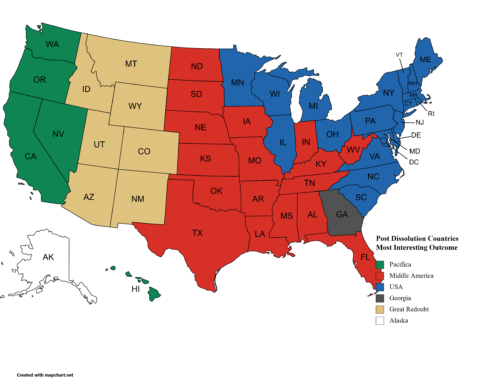Yesterday’s news presented two articles (one by the Washington Post and the other on the blog, Medium) that seemed widely disparate, one about retired general David Petraeus remaining in the limelight well after his ignominious retirement, and the other about xenophobia in Germany against Muslim foreigners. What could these articles possible have in common? Samuel Huntington.
In 1957, Huntington wrote the seminal work on civil-military relations title The Soldier and the State. Aside from defining what makes officership a profession, Huntington laid out the responsibilities of senior military leaders. He names them in this order: 1. Tell the civilian leadership what you considers necessary for the minimum security of the state, 2. analyze and advise the civilian leadership on the implications of alternative courses of action, and 3. implement state decisions with respect to national defense even if those orders run counter to his judgment. Huntington makes it very clear that the officer is to be completely apolitical.
Author James Weirirck says, “At this point it is beyond question that Petraeus is a politician, in the worst sense of the word. He is willing to distort reality into any narrative that serves his ultimate purpose: the advancement of David Petraeus.” But it is not only that Weirirck says Petraeus is a politician now. Lots of military people have gone on to political office after separation from service. Weirirck says Petraeus was a politician while in office. Weirirck quotes Michael O’Brien of the Warfare Inc. blog accusing Petreaus and Colin Powell of going beyond their Huntingtonian responsibilities: “Petraeus is just like Colin Powell: he wanted to be a politician when he was being paid to be an army officer. They both had their priorities wrong, and look at the results we got out of them.”
So this blog post is not a hit on Petraeus or Powell, but a discussion of Samuel Huntington and his warnings from more than 50 years ago. Sure, lots of former officers run for and gain political office. But like Eisenhower and Marshall, they become the class that directs their former selves. They don’t run for office to be controlled by their former peers. I agree that military officers who engage in political maneuvering are lowering the professionalization bar for the entire officer corps. We have an entire generation of officers now who act, in my personal opinion, brazenly and openly in the political arena to the detriment of their professionalization. And when senior general officers tell their mid-grade professionals that the target of our efforts must be the national political leadership to convince them to do what the military thinks is best, then we have upended the Huntingtonian admonition.
What is the alternative? How about General Ron Fogleman, former Air Force Chief of Staff, who resigned when he decided that he was no longer aligned in philosophy with the Secretary of the Air Force and Secretary of Defense. He resigned without a political speech. He stayed off TV and out of the papers. When asked by senior leaders to comment on issues, he did so privately. When asked to be a senior mentor at exercises or to speak, he focused only on the specific issue at hand. Retiring as Chief of staff to private life hasn’t hurt his legacy. His composure and life after service only made his legacy greater.
Now on to the other Huntington issue: xenophobia and civilizational clash. The Post’s Anthony Faiola writes about German attacks on foreigners and how those attacks are invigorating debate within Germany on the issue of treatment of refugees. In 1993, Huntington, writing in Foreign Affairs, asked whether the future would see a “Clash of Civilizations”. His 1996 book of the same title concludes that stable civilizations are the best protector against world war and that clashes between civilizations would be ruinous to modernity.
There are many today who would argue that we are in the early stages of civilizational clash worldwide and that “the West” needs to protect its civilization from dilution or defeat. Others claim that movement between peoples and dilution are exactly what the world needs to prevent civilizational clash. So how is that working in Europe? The Post shows the number of refugees from the Middle East in each European country. Some numbers are very large given the size of the population.
In the United States, which was founded on a creed and not on a nationality, we are all descendants of immigrants. In countries based on historical ethnicity, it is easy to tell who is a foreigner by the way they look or accent with which they speak. Some have begun to ask themselves how far their obligation to assist refugees extends into the future. How many more do they have to take at the expense of their social welfare systems and resources. Most feel no need to integrate the refugee populations beyond giving them housing and the possibility to find jobs.
So my question is whether Europeans are unintentionally exacerbating a clash of civilizations by saying no more to refugees, or merely standing up for historical cultural norms which they see under threat from newly arrived people of other cultures. Would Huntington say that the civilizations hold each other in check only if geographically separated? What happens if they are intermixed?
Two interesting and difficult issues raised by two different authors for two different audiences on the same day, both tracing the exposition of their foundational theories to Samuel Huntington. Both are normative discussions of how things ought to be. In Soldier and the State, Huntington says this is how senior officers should act, and if not, then discusses consequences which ultimately lead to the endangerment of the state itself. In Clash of Civilizations, he says that civilizations must learn to live side-by-side with peaceful interchange and mutual respect. But what happens when an intellectual tipping point hits one or more civilizations who believe those respectful and peaceful interchanges have been upset? Can we back down from either or both of these precipices? If not, then the near future could be a really uncomfortable time in which to interact with anyone but your closest neighbors and friends. Lets hope it isn’t so.





I recently attended JPME II in Norfolk where the issues you raise here was very much a topic of discussion. I asked two guest speakers (who, in the spirit of non-attribution, will remain nameless) when is it right or prudent for a General Officer, after his/her guidance and council is ignored by our civilian masters, to throw his rank on the table.
Both answered by saying that is a question each individual has to ask themselves. But it was apparent that they were letting their egos interfere with the decision making process by determining they could do more good by staying within the system.
A few days ago I noted an article in which 200+ retired GOs signed a letter expressing their concern over the administration’s deal with Iran. It made me wonder why the active duty GOs appear to be silent.
Also discussed in the course was attitudes toward refugees both in Europe and our own crisis on the southern border. Our German officer said that there are many Germans who are anti-immigrant. I had to stop him and explain how saying people are “anti-immigrant” is an attempt to stifle discussion and project hate and intolerance on those who hold an opposing view. I asked him, rather than saying “anti-immigrant” is it fair to say “pro-America” or “nationalist?”
On that note, I think Huntington would agree that the roots of our demise are being sown by our own failure to promote unity. Whether it’s a family, a neighborhood, a team, or a country, discord will contribute to destruction.
Randy,
Good comments. For years, general officers have spoken to PME audiences about this topic and more often than not, they say that they can do more to help or protect their people from within the system than outside of it. I heard many say this in person, and I think that in all cases, these GOs are well-meaning. However, in many cases, they are, in my opinion, self-serving and don’t realize that by saying that they must stay in the system to keep it moving forward or to do good, they are saying that without them it would all fall apart. Lt Gen Mike Short said as much in 2000 when asked why he didn’t resign when he so viscerally disagreed with Gen Wesley Clark, who was constantly hammering him and who misused his position. Short said that if he resigned, Clark would replace him with a lackey. That kind of thought infers that you are the only one who is righteous and that others below you couldn’t do what you think you can. It is a subtly arrogant mindset that disregards history and sociology. Throughout history, people have risen in rank, retired, and were forgotten. That is the normal state of affairs. General Fogleman once told someone who said he wished that Fogleman would remain engaged that the future was in good hands, his hands (meaning the next generation). It needs to be that way.
As far as the second issue, “anti-immigrant”, “pro-America” and “national” all really mean the same thing. I would just caution that Germany is not the US. Germany rose and unified as a country that shared common language and cultures and geography. It is smaller than Montana. GK Chesterton said that “America is the only country ever founded on a creed.” We relied throughout history and still do today on immigrants. When people say they are pro-America as a way of positioning themselves opposing immigration from our southern border, they are being historically consistent, but wrong. Americans were successively violently against immigration by Irish, Italians and Jews. So If I was in that seminar as either a student or as the instructor, I would have asked that your German classmate keep going and expand on his comments and drawn out the implications. I would have asked what other foreign officers say on the same subject.
Your last point is spot on. That is exactly what Huntington said at the end of Clash of Civilizations. But in reality, that has historically been a pipe dream. worthy of hope, but I’d ask what would have to happen to make that hope come true.
Keep writing. This was great
I hope you’ll forgive the re-engagement but your comment on immigration compelled me.
I may be misinterpreting your point but I don’t connote “Pro-American” with bigotry or the promotion of violence against “others.” Indeed, I believe that is exactly the sort of word-twisting used against certain Americans in order to malign their character or at least impugn their position on the issue. I am not promoting violence, I am promoting assimilation and adoption to the creed of America.
To that point, I offer Teddy Roosevelt who said, “We should insist that if the immigrant who comes here does in good faith become an American and assimilates himself to us, he shall be treated on an exact equality with every one else, for it is an outrage to discriminate against any such man because of creed or birthplace or origin. But this is predicated upon the man’s becoming in very fact an American and nothing but an American.”
Regarding the other point about GOs and their collective silence on matters of national security, I am interested in your thoughts on Hillary Clinton and her apparent disregard for proper security procedures. Wouldn’t it be prudent for GOs both active and retired to demand a criminal investigation? After all, this administration has demonstrated the willingness to charge and sentence David Petraeus for a similar, if not significantly lesser, malfeasance.
Regards,
Randy
Randy,
Thanks for the notes. Good dialog.
I agree with Teddy Roosevelt in the quote you mention. It is beyond me why someone would come to this country to receive its benefits and blessings and bad mouth it and remain more loyal to the place they left than the place they live their lives. If anything breaks the US apart, this will be a significant factor, but not the only one.
As to Secretary Clinton, the investigation is not over. I would find it difficult for this president to ignore her security breach given the current justice department’s zealous prosecution of cases in the past 6 years. I have no problems with GOs stating their private opinions as private citizens, but I think it would cross the line if they used their rank and former positions in a political sense or to influence those still serving. This is the tightrope we walk in civil-military relations in this country.
You’ve brought up two cleavages in our society that some think are fine lines to debate only academically and others think are potential rupture points in society.